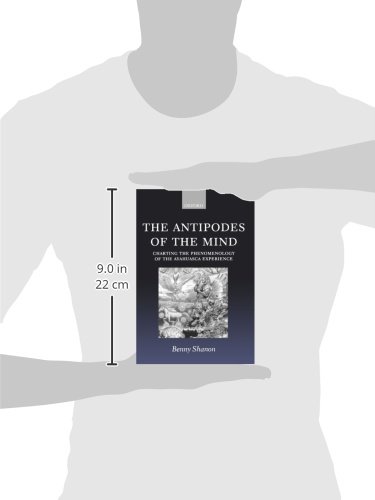



The Antipodes of the Mind: Charting the Phenomenology of the Ayahuasca Experience
T**C
Enthralling essay on what lies beyond the veil
Although the book can feel somewhat bulky and challenging to some, Shanon manages to deliver his message in a very appropriate way to capture both the scholar and the curious in a similar manner. It is clearly written to appeal to the science prone minds, yet by mixing in his own insights, the author is able to create small niches of reflexions throughout the book that are bound to keep you locked in some form of internal dialogue. I wouldn't say it is the best book out there if you're only now delving into the fascinating world of entheogenic plant medicine - you're probably better off starting with Razam's Aya: A Shamanic Odyssey or Narby's The Cosmic Serpent -, but it's nonetheless a very accomplished and objective database on what is known about this alternative, often misunderstood side of human existence.
W**M
Important work.
The Antipodes of the Mind is an important bit of work from Israeli academic Benny Shannon... However, two important things to bear in mind. (i) Firstly, the general tone and structure of this is arguably quite dry - those looking for a juicy ayahuasca narrative that they can sink their teeth into might be a little disappointed. (ii) Secondly, it does tend to squeeze ayahuasca experiences into Western academic paradigms - this is both its strength and weakness. It places ayahuasca in a context some Westerners might understand, on the other hand, one is sometimes left with the impression that something gets lost in translation. However, if your happy to plough through some rather dry sections you should enjoy this quiet and far ranging classic. For those interested in Ayahuasca other good books (perhaps not suffering from the shortcomings listed above) - 'The Wizard of the Upper Amazon', 'Yage: the new Purgatory', 'The Jaguar that Roams the Mind' are all great reads each with something special to offer interested readers (all on Amazon.co.uk)... The soon to be released 'Singing to the Plants' looks like being one to get hold of.
M**G
Excellent
Very informative
S**H
Shanon's intelligent, scholarly approach was a breath of fresh air ...
I read this book (well, most of it anyway) while drinking ayahuasca ceremonially at a retreat in Peru. It was probably the most important book I read there. It struck me as serious, technical, thorough, knowledgeable, vast in scale, and not least way above my level academically. As a layperson, I'm sure I didn't understand half of what I read, but the small portion I did understand kept me captivated for hundreds of pages. I read it for pleasure. It's a 400+ page scientific paper for goodness' sake. Shanon's intelligent, scholarly approach was a breath of fresh air in a social atmosphere plagued by spirituality and mysticism -- even if Shanon does take that kind of thing into consideration as well.As an interested non-specialist I hugely enjoyed this book and think I will return to it many times.
S**Y
A landmark of research on altered states
This is one of the most compelling books on altered states I’ve read, up there with James’s Varieties of Religious Experience, Huxley’s Doors of Perception (to which Shanon’s title alludes) and PIHKAL and TIKHAL by Ann and Alexander Shulgin. Unlike, say, the psychedelic performance artist Terence McKenna (whose writings I enjoy), Shanon’s authorial persona is earnest, serious, straightforward, absolutely trustworthy. He is a true scientist, dedicated to precise reporting and careful analysis rather than to entertainment. Not that his book is dull. Far from it. Antipodes is suffused with a sense of genuine adventure, of a kind that has virtually vanished from modern science. Plunging into the depths of his own ayahuasca-intoxicated mind, Shanon resembles one of the great Victorian explorers trekking into uncharted wilds, maintaining his equilibrium and wits even in the face of the most fantastical sights. Like Darwin on the voyage of the Beagle, Shanon is concerned primarily with collecting and categorizing data rather than theorizing. At the end of his book, however, he ponders his and others’ experiences and draws some tentative conclusions. Ayahuasca, he asserts, can be both truth-revealing and "the worst of liars." Shanon remains skeptical of the occult claims often made for the drug—that it puts us in touch with spirits, makes us clairvoyant, lets us leave our bodies and travel astrally. He suggests that ayahuasca visions are products of the imagination rather than glimpses of a supernatural realm existing in parallel to our own. This proposal will sound reductionistic to some, but it is actually quite provocative, and raises many questions requiring further consideration. Why does the imagination, when stimulated by ayahuasca, yield visions so much stranger and more powerful than those we encounter in, say, ordinary dreams? Why do ayahuasca-drinkers from widely disparate cultures so often hallucinate similar phenomena, such as jaguars and snakes, or palaces and royalty? Why are the visions of even an atheist like Shanon so often laden with religious significance? Antipodes will no doubt be eagerly seized upon by the psychedelic intelligentsia. But it deserves to be read by anyone interested in religion, mysticism, and consciousness--and who is not? It should be required reading for psychologists, psychiatrists, and neuroscientists, because it shows how absurdly simplistic are the biochemical, Darwinian, and genetic models now dominating mind-science. Inner space, Shanon reminds us, truly is the last great frontier of science, and its reaches are vast and wild and strange.
Trustpilot
4 days ago
1 month ago